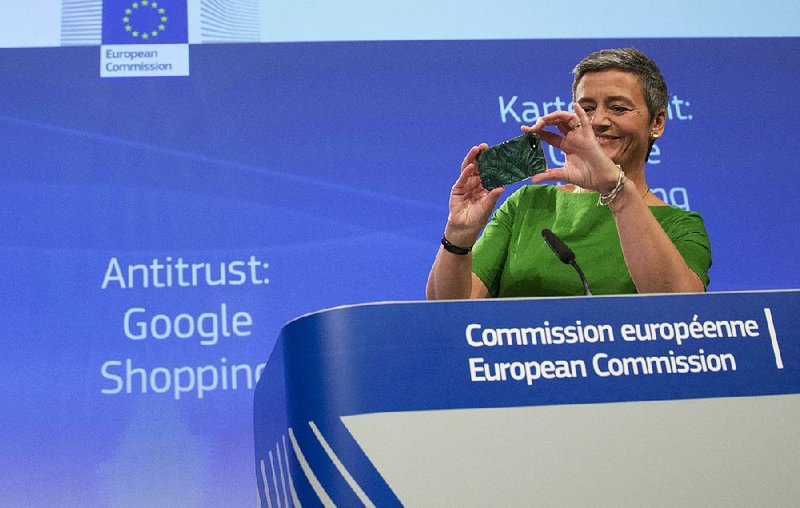BRUSSELS -- The European Union's antitrust chief fined Google a record $2.7 billion Tuesday, saying the powerful Web-search leader illegally steered users toward its comparison shopping site, and warning that other parts of Google's business were in the cross hairs.
The fine is the largest the European Union has levied against a company for abusing its dominant position, and marked the latest confrontation over business practices between EU regulators and American tech giants. Google could face additional penalties if it loses an expected appeal and fails to comply.
If the ruling stands, it could reshape the company's behavior in one of its most lucrative markets. And the way Google presents its search results could shift worldwide.
The EU decision also sets up a wider clash -- touching on whether government regulators hold power over one of the world's most dominant companies, and testing the limits of competition-regulating rules in an age of borderless commerce and online interactions.
"Google has abused its market dominance in its search engine by promoting its own shopping comparison service in its search results and demoting its competitors," EU competition chief Margrethe Vestager told reporters in Brussels.
"What Google has done is illegal under EU antitrust rules. It has denied other companies the chance to compete on the merits and to innovate. And most importantly, it has denied European consumers the benefits of competition."
The decision reinforced Vestager's emerging role as the world's most aggressive antitrust regulator, after a $14.6 billion back-tax judgment against Apple last year.
The announcement caps a seven-year investigation into Google's trade practices. Other related cases against Google are ongoing.
Google -- which is considering an appeal -- issued a statement minutes after the EU announcement, claiming the company's shopping site helps both consumers and advertisers.
"When you shop online, you want to find the products you're looking for quickly and easily. And advertisers want to promote those same products," Kent Walker, Google senior vice president and general counsel, said in a statement.
"That's why Google shows shopping ads, connecting our users with thousands of advertisers, large and small, in ways that are useful for both. We respectfully disagree with the conclusions announced today," he said. "We will review the Commission's decision in detail as we consider an appeal, and we look forward to continuing to make our case."
Under European rules, it is up to Google to find a way to comply with the judgment, and Vestager offered no specific guidance about how it must modify its services.
If it does not abide by the ruling within 90 days, however, Google could face penalties of up to 5 percent of the daily turnover of Alphabet Inc., its corporate parent, which could be backdated years.
"This is really sending a message to Google: Change or we'll come after you," said Thomas Tindemans, the chairman of the Brussels office of Hill+Knowlton Strategies, a consultancy, who has worked on previous technology antitrust cases.
Europe's unified market gives regulators extra clout as they take on international business titans. With more than 500 million residents, the 28-nation bloc has more consumers than the United States. And its regulations about fair business practices tend to be stricter than those that come out of Washington, meaning U.S. tech companies are often a focus.
The holder of the previous record fine was Intel, the chip manufacturer, which was hit with a $1.2 billion penalty in 2009.
The EU antitrust chief, a former deputy prime minister of Denmark, said Google had illegally taken advantage of its lead standing in the world of search engines, pushing users toward its comparison shopping service and advertisers over those of rivals.
The European Commission directed Google to open up its shopping search results to the tech company's competitors.
"They're going to have to change their conduct," said Thomas Vinje, legal counsel to FairSearch, a lobbying group that has helped organize the legal challenge to Google in Europe.
And as President Donald Trump advocates an America-first policy of trade protectionism, the ruling also raised questions about how his administration would respond to the penalty assessed against one of the richest companies in the United States.
The answer was not immediately obvious.
Trump has spoken at times of a need for aggressive antitrust regulation, and Google's close ties to the White House under President Obama have been severed under the new political order.
Trump's own relationship to the tech industry has become strained amid decisions to impose travel restrictions on some Muslim majority countries and to withdraw from the Paris climate agreement, two steps that clash with Silicon Valley's socially liberal culture. But several U.S. companies, including Yelp and Expedia, were official complainants in the European case against Google, dampening the Europe vs. America dynamic.
A White House spokesman declined to comment on the EU case against Google, saying the administration would take no position on pending litigation.
Yelp said Tuesday that it had not decided whether to press its case against Google before U.S. regulators. "We are going to leave all options on the table," said Luther Lowe, Yelp's vice president of public policy.
Despite Trump's populist rhetoric, the president lacks direct influence over any potential investigation by the Federal Trade Commission or the Justice Department, the two agencies that could conceivably investigate Google. He could shape the process by appointing senior officials to the department or the FTC who may be more inclined to pursue an aggressive antitrust agenda. But Trump has also been slow to fill those seats.
The Federal Trade Commission closed a similar investigation against Google in 2013 in exchange for Google's changing some of its business practices.
"The lion's share of work on this case has been advanced by U.S. companies who had to go to Europe after a politically captured FTC failed them," said Luther Lowe, vice president of public policy at Yelp, a review website.
Information for this article was contributed by Brian Murphy and Brian Fung of The Washington Post.
Business on 06/28/2017
